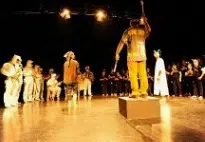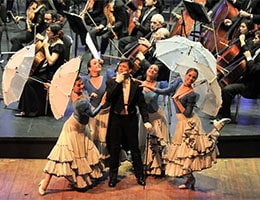 The concept of operetta derives from operetta , an Italian word that is the diminutive of opera (or “opera” , in our language ). The term refers to a comic opera that deals with frivolous themes .
The concept of operetta derives from operetta , an Italian word that is the diminutive of opera (or “opera” , in our language ). The term refers to a comic opera that deals with frivolous themes .
The operetta combines sung fragments with spoken sections. Throughout the presentation, which is characterized by its absurd plot, music and dialogue alternate. It should be noted that the notion also refers to the libretto and music of these works and even to the genre itself.
Operettas emerged in the 19th century as a derivation of traditional operas . The first were presented in France and then also became popular in Austria .
According to specialists, the Parisian operetta is linked to the genre known as opera-comique . Composers such as Florimond Ronger and Jacques Offenbach appear among its promoters.
The link between the French operetta and the opera-comique is stronger than a mere inspiration, since it emerged as an evolution of it. Florimond Ronger, for many the father of this genre, composed Don Quixote and Sancho Panza , which is often cited as the first operetta in history . Offenbach, for his part, after assuming the direction of an important French theater in 1855, began to compose and premiere a series of lyrical works that he considered belonging to the genre of opera buffa , although given their characteristics little by little they entered the genre of opera. operetta by music scholars.
As for the Viennese operetta , it emerged as an imitation of the Parisian one, although it usually presents more serious arguments . Among its main creators are Johann Strauss and his son, Johann Strauss II .
The influence of operetta on other genres is notable. The zarzuela , the farce and the magazine , for example, adopted some of its features.
Regarding the differences between opera and operetta, they are not always so obvious, especially for those less knowledgeable in both genres. In other words, let's say that some operettas can pass for operas and vice versa unless you have the knowledge and experience to distinguish one genre from the other .
 Opera emerged in Italy during the first half of the 17th century, and also consists of a fusion of instrumental music, singing and acting on stage. The story goes that before spreading throughout the European continent and, later, throughout the world, opera was brought to Austria. The popularity of this art form is very particular, since it has remained alive over several centuries and still continues to this day with enough strength to sell millions of records and fill major theaters.
Opera emerged in Italy during the first half of the 17th century, and also consists of a fusion of instrumental music, singing and acting on stage. The story goes that before spreading throughout the European continent and, later, throughout the world, opera was brought to Austria. The popularity of this art form is very particular, since it has remained alive over several centuries and still continues to this day with enough strength to sell millions of records and fill major theaters.
Two centuries later the operetta appeared, whose most obvious difference is that the performances are less extensive. The fact that the singing is intertwined with dialogue parts brings it closer to musical films than to operas in which there are so-called recitatives , parts in which the characters present texts with a certain melody, which places them halfway between a pure recitation and a song.
In colloquial language , on the other hand, what is grotesque or false is referred to as “operetta.” Thus it is possible to find expressions like “These operetta revolutionaries make me laugh,” “We are not going to succumb to an operetta conspiracy.”
In Argentina , finally, operetta is a term that is used in a derogatory way to refer to a political operation (a maneuver that is carried out with the intention of achieving something) that aims to cause damage : “The main opposition candidate was harmed by a government operetta.”
